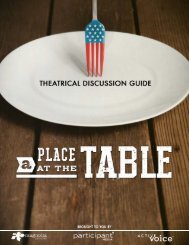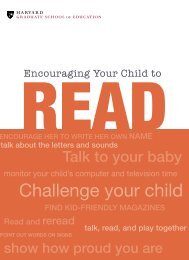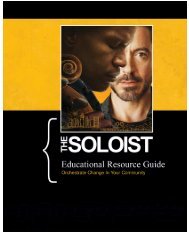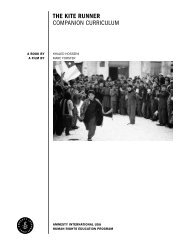Sharpen your conflict resolution skills with our activity guide - TakePart
Sharpen your conflict resolution skills with our activity guide - TakePart
Sharpen your conflict resolution skills with our activity guide - TakePart
- No tags were found...
You also want an ePaper? Increase the reach of your titles
YUMPU automatically turns print PDFs into web optimized ePapers that Google loves.
Procedures:1. Write the following prompt on the chalkboard or on chart paper. Allow 10 minutes forstudents to respond in their j<strong>our</strong>nals or notebooks.“Good fences make good neighbors.”2. Ask the class what they think this phrase means. What do you think makes a betterneighbor—a fence or no fence? How does a “wall”—literal or figurative—make for a goodneighbor or friend? How might it make for a bad neighbor or friend? What makes a betterneighbor (or friend): good boundaries or good communication? Why?3. Ask for volunteers to share their freewrite responses. Allow 10 minutes for students to sharewhat they wrote.4. Ask the class when boundaries are most important. Explain that physical boundaries aresometimes (but not always) erected when people have stopped respecting each other orlistening to each other, or when people feel threatened (by perceived or actual threats). Usethe example of two neighbors. When might two neighbors feel the need to build a picketfence between their properties? What environment would enc<strong>our</strong>age them to NOT build awall or fence?5. Write the following quote underneath the first one.“Don’t burn <strong>y<strong>our</strong></strong> bridges.”6. Ask the class what they think this quote means. Elicit and chart student responses on thechalkboard or chart paper.7. Ask the class when people might choose to erect a bridge—literally? Why are bridges built?What do they do?8. Ask how fences and bridges might symbolize war and peace, or miscommunication andcommunication, or hate and love.9. Suggest that when people (or groups of people) stop listening to each other, and stop treatingeach other <strong>with</strong> respect, miscommunication can occur. Miscommunication can lead tofrustration and a feeling of not being respected, which, in turn leads to <strong>conflict</strong> andaggression. Likewise, if miscommunication is recognized and stopped, <strong>conflict</strong> might beresolved peacefully.10. Write the following terms on the chalkboard or on chart paper:BLOCKS TO PEACE STEPPING STONES TO PEACE• GREED• GENEROSITY• DISRESPECT• RESPECT• CENSORSHIP• FREE SPEECH• PREJUDICE• TOLERANCE• FEAR• SECURITY• NOT LISTENING • COMMUNICATION• PEER PRESSURE • CONFIDENCE• RIVALRY• COOPERATION• INDIFFERENCE• COMPASSION• OPPRESSION• CIVIL RIGHTS© 2008, Participant Media www.takepart.com/JimmyCarterManFromPlains









